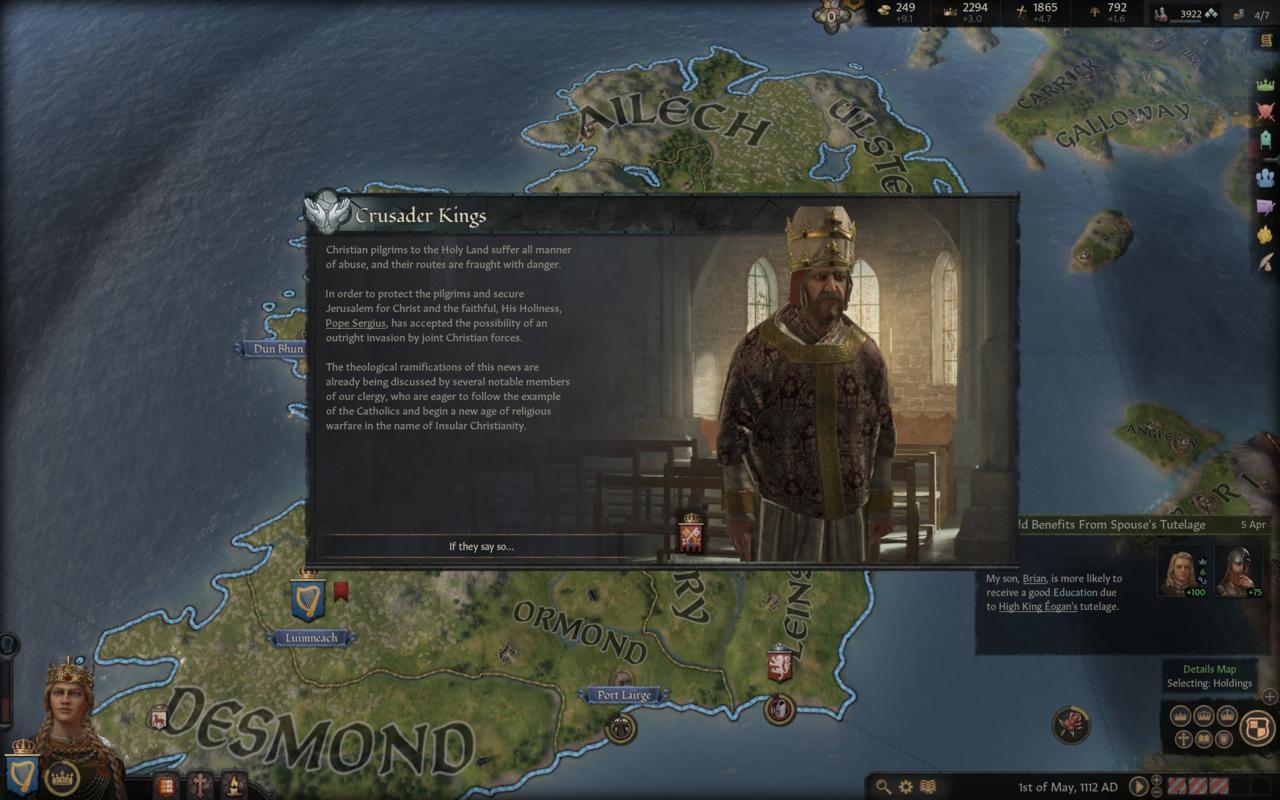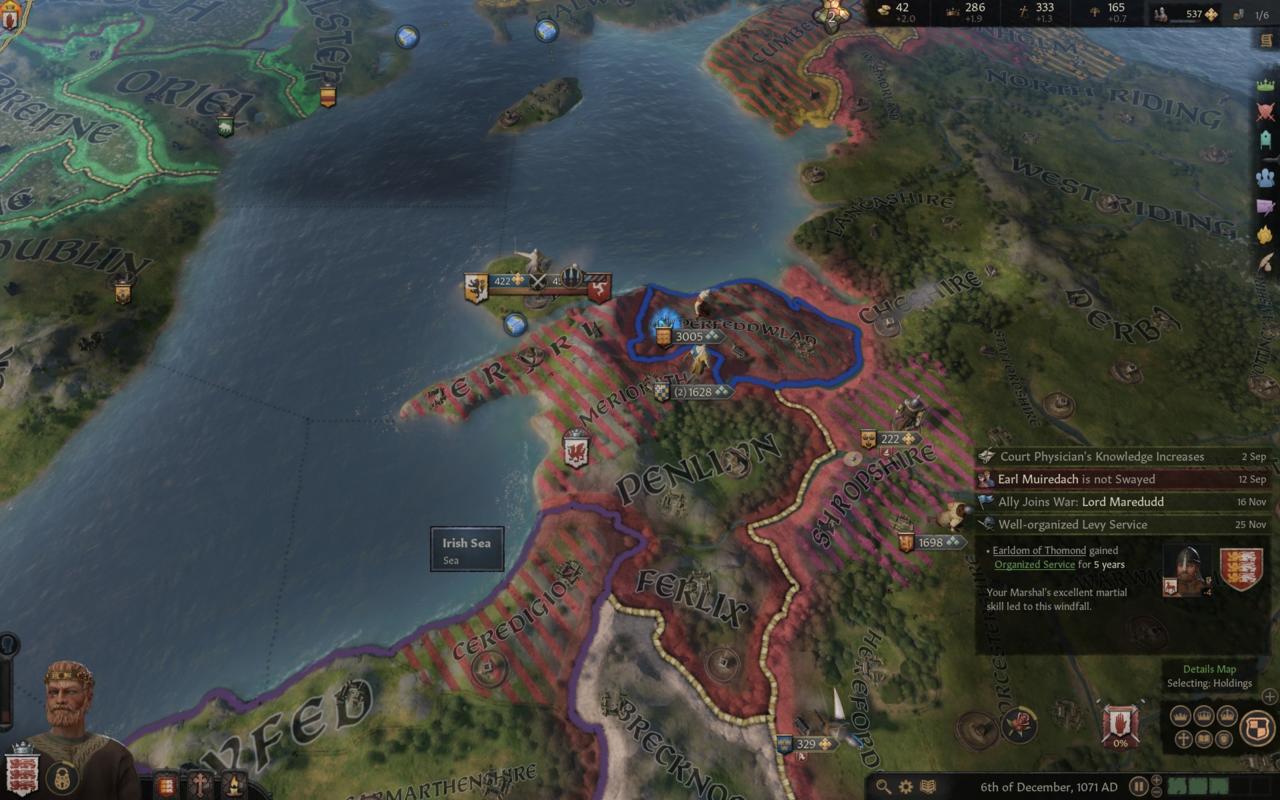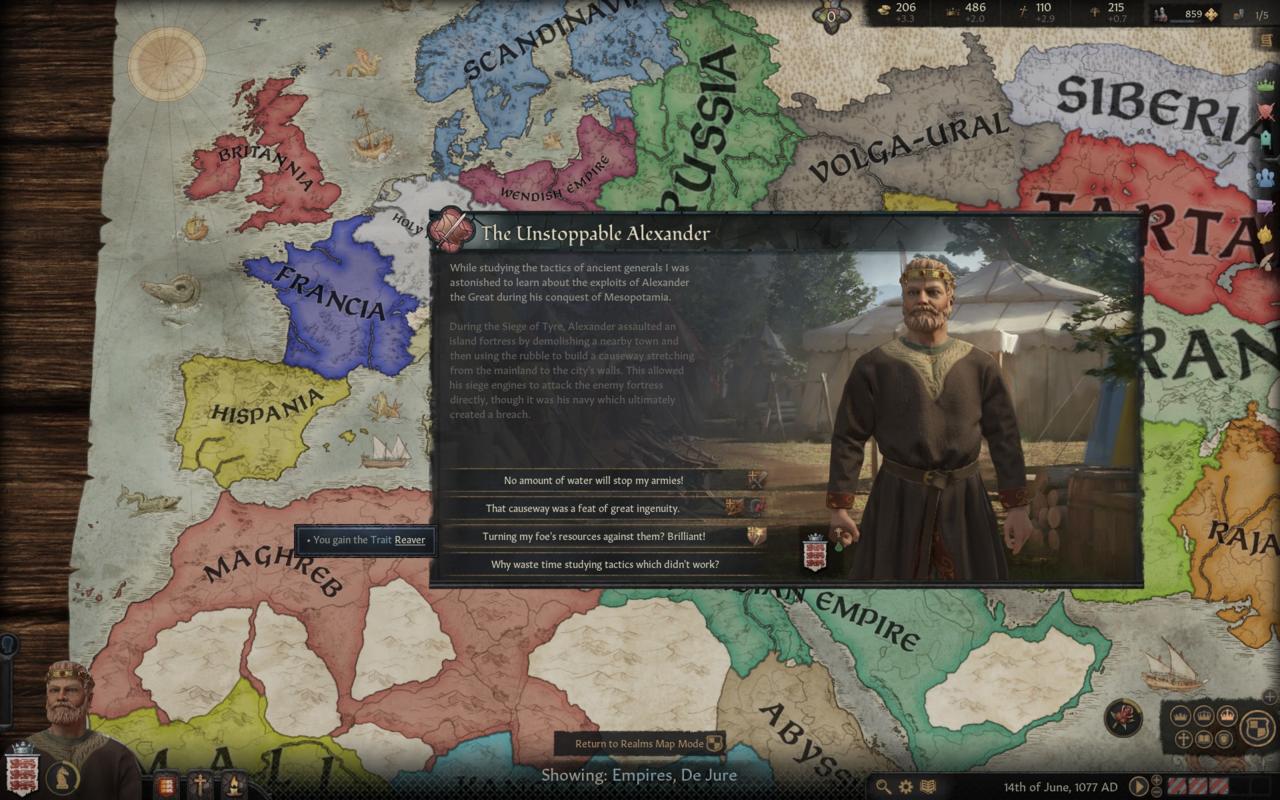Hands up if you’ve heard someone tell a story about their game of Crusader Kings 2. About their efforts to topple a dynasty via generations of plotting and scheming finally falling into place as if Rube Goldberg himself was a master spy. Or perhaps you heard something about marrying a horse and leaving it to inherit your entire kingdom. It’s a series that sounds incredible in the abstract--the perfect digital representation of Game of Thrones--yet reality intervenes in the shape of boring looking maps, reams of statistics, and a litany of esoteric terms of concepts. Keep your hand up if you really want to give Crusader Kings a try, but find it all a bit too intimidating.
Crusader Kings 3 is the best place to start. For one, it looks more appealing. Gone are the rather plain 2D character portraits, replaced by detailed 3D models that change dynamically over the course of the game, wearing scars earned through battle wounds or simply growing old both gracefully and disgracefully. For two, it’s just been released and isn’t yet jerry-rigged with dozens of new updates and DLC expansion pulling it all in unwieldy directions, as has been the case with CK2. And three, CK3 is more interested than it's ever been in providing an opportunity for novice players to enjoy its myriad charms. There is a solid tutorial, helpful in-game encyclopedia, and a seemingly endless supply of tooltips. The guardrails are firmly in place.
But even so, it can still be daunting to load a new campaign and find yourself staring at a map of bewildering size, chock-full of realms and people and religions and cultures you don’t intuitively understand. These tips should help you overcome the fear and doubt of playing Crusader Kings for the first time. They won’t address any advanced strategies, but they should be enough to get you up and running and ready to learn more. And if you need a bit more background, read our Crusader Kings 3 review.

YOU ARE A PERSON
You don’t play CK3 as a civilization or an empire. You don’t even play as a country or state. You play CK3 as a person. A relatively important person, to be sure--you will have land to your name, sometimes quite a lot of land--but you are still a single human being. So when you choose to play as Duke Vratislav of Bohemia, you oversee a handful of counties around Prague and have claims on a couple of others. But even though your brother Konrad is the count of a nearby county, you can’t simply tell him what to do. Indeed, given he has claims on all your holdings, he is probably going to be your biggest rival. Meanwhile, Bohemia itself is merely one duchy within the greater Holy Roman Empire. As of 1066, in this example, Emperor Heinrich IV is your boss, essentially, and so tending to that relationship may well be even more important than dealing with your brother.
YOU CAN PLAY AS ANY PERSON AT ANY TIME
Perhaps the most obvious indication that Crusader Kings 3 is not a game about winning and more about enabling players to craft unique storylines is the ability to play as a different person whenever you like. Yes, that’s right, at any moment you can hit ESC to pull up the pause menu, select “Switch Character” and you’re free to continue the current campaign as the existing ruler of another realm. (Note that if you are playing with Ironman rules, the option to switch characters is disabled.) Losing a war against the King of England? There’s no shame in switching characters to be the King of England. Bored of Scandinavian tribal wars? Go ahead and take over as the new Maharaja of Pala. There are thousands of lives out there just waiting for you to explore.
START IN IRELAND
Ireland is the perennial beginner zone in Paradox games and it remains the case here, too. Playing as Petty King Murchad, Duke of Munster and one of the highlighted characters in the 1066 “Rags to Riches” field, is the best way to acclimate yourself to the basics of play. Ireland is small and relatively isolated so you only have a few people and titles to get your head around. Murchad is already the most powerful lord in Ireland, and neither Scotland nor England are yet equipped to expand across the Irish Sea, so you also don’t have the stress of trying to grow your realm while simultaneously avoiding the eye of someone who could crush you. And perhaps most importantly, if you opt to play the tutorial, you already begin as Murchad.
PLAY THE TUTORIAL
I suspect this goes without saying, but I cannot emphasise it enough. Play the tutorial. It does a good job of introducing the basic concepts and terminology while running you through how to perform a range of essential actions. It’s not comprehensive by any means, and to be honest, while I think it’s an effective explanation of which parts of the interface do what and how certain features work, I do think it could do more to prepare new players for why and when they should consider trying certain actions. Despite that failing, the tutorial will let you establish a firm foothold in Ireland before the training wheels are removed. Afterwards, you’re not completely on your own, however, as the in-game encyclopedia (the little book icon, bottom centre of the screen) and hyperlinked tooltips remain to provide a wealth of descriptive information, if not guidance.
DIFFICULTY
When you commence a new game you have the choice of three difficulty options: Normal, Easy and Very Easy. Normal is the default and is the one I would recommend, even while you are learning. In part this is because the easier settings don’t make it simpler to paint your way across the map--your armies don’t do more damage, as in other games. Instead, events that are likely to negatively affect you are diluted. An AI plotting a hostile scheme is less likely to succeed on the easier difficulty, or rebel factions are less likely to rise up against your rule, and so on. For me, this only makes the overall game less interesting. Remember, Crusader Kings 3 isn’t a game about winning; it’s a game about story-telling. So, really, the easier difficulty settings are only denying you the potential to tell more diverse, more unpredictable stories.

YOU CAN’T JUST DECLARE WAR
So you’ve got a few counties in the bag, but you would like a few more. That one just to the east looks nice, yet when you right-click on its ruler the option to declare war is greyed out. That’s because you always need a claim on a particular title (a bit of land, basically) in order to fight for it. Sometimes you or one of your family or vassals will have inherited a claim that you are then able to press. Other times, you can send your bishop to dig through the law books and fabricate a claim. When you now go to war, it’s important to keep in mind you are fighting over this specific claim; once all the sieging and stabbing is done, whoever wins gains only whatever was first claimed. So, for example, if you go to war over a claim to Coimbra, and you win the war by sieging the castle of Braga in Porto, then you still only get Coimbra. You don’t get to keep Porto, too. This will be confusing the first time it happens. Make sure you understand which claim you are fighting for and to read the terms (and conditions) when you enforce your demands to conclude the war.
THE ISSUES TAB IS YOUR FRIEND
The icon new players should click most is the stained glass cross at the top of the screen. This drops down your Issues tab, typically a list of pressing concerns that you probably want to address sooner rather than later. It’s not a list of instructions. It’s not a quest log or series of objectives. Don’t think you need to obey its every command. But it is a useful nudge, a firm elbow in the ribs to get your wavering attention back on track. I recommend checking in on the Issues tab once a month to see what’s new, and to give serious thought to its suggestions. But just because it says you can declare war on England, doesn’t mean you should declare war on England right this second.
NORMAL SPEED
CK3 is played in real-time, where a week can disappear in a few seconds, and you might think it sensible to play at the slowest of the five game speeds while you are learning. Don’t. Stick with the default speed. Erratic isn’t quite the way to describe the pace of play, but there will be long periods where you will have nothing to do, or nothing that you want to do, and it’s fine to sit back and wait. Significant events will automatically pause time while you decide a course of action, so there’s no fear of missing out. It’s a good idea to manually pause every few weeks or months just to check in on things, like assessing any guests recently arrived to your court or if one of your holdings has enough gold to build a barracks. Bear in mind, you are a ruler, you don’t need to micromanage; that’s what your council and vassals are for.
JARGON
Crusader Kings 3 throws a lot of jargon at you. Even as the tutorial patiently explains what “de jure” means or the difference between a barony and a duchy, it’s perfectly normal to feel overwhelmed. Eventually, it will be important for you to understand the implications of, say, “Confederate Partition” succession versus regular old “Partition” succession. But there’s no need to obsess over such details at this stage. Events just happen in Crusader Kings 3 even without your input, and there’s enough for you to be getting on with without also fretting about things that don’t quite make sense. Each time an unfamiliar term arises, hover the mouse over it and read the tooltip. Gradually you’ll learn by experience.
IT’S OKAY TO SUCK
Or rather, it’s okay if bad things happen. Or, even better, the game is even more interesting when bad things happen. You want bad things--terrible, tragic things--to happen. And, when they inevitably do, embrace them. Role-play through them. Let them form another chapter in your epic life story. This is why I recommend you resist the urge to hire only the best people or consider only those with incredible stats for a future spouse. Of course, it can be great to recruit a spymaster with an intrigue rating that’s off the charts, or find for your heir a wife who brings desirable congenital traits. But it’s also great when you do the opposite. Hire the world’s worst Martial, marry your only son to the barren daughter of your most deceitful vassal, and by all means welcome with open arms the traitorous blackguard who turned up to your court uninvited and offering nothing but flattery. I’m sure it’ll work out fine. And if it doesn’t, at least you’ll have a terrific story to tell.

YEAH BUT WHAT AM I SUPPOSED TO, YOU KNOW, DO?
Whatever you want. CK3 starts in either 867 AD or 1066 AD and, by default, a campaign will end in 1453 AD (though you can change this in the Game Rules). In between, you live your life, then your heir’s life, then their heir’s life, then their heir’s heir’s life, and so on until you run out of heirs or hit the end date. Whatever you do with those lives is entirely up to you.
Of course, without the game setting goals for you, new players will feel insecure. This is normal. You’ll feel paralysed by choice, or you’ll feel aimless, or you’ll feel both at once. Again, do not worry! What you want to do is think of CK3 as an RPG. Look at your current character’s stats, perks and personality traits, and set them some short and long term goals to role-play towards. Got a king who is lustful and fertile? Play to father as many children as possible. Got a caliph with a ridiculous martial stat? Go to war and when you win that war, go to war again. A good idea is to focus on one thing at a time, whether it be getting your neighbours to like you then vassalising them or scheming to murder any serious rival, pouring resources into spreading your culture or making sure your children have the best possible education.
At the end of the day, there is no right or wrong way to play Crusader Kings. The player who conquered Africa and the Middle East did not beat the player who united Ireland and passed the kingdom to their beloved granddaughter. They just chose a different path. Give it time and you’ll find yours, too.

